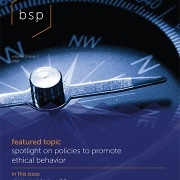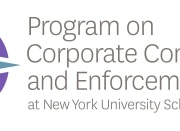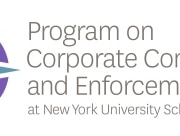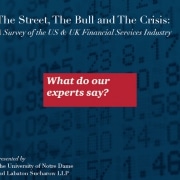Crosspost: The (Il)legitimacy of Compliance?
 Cross posted from NYU Law’s PCCE’s Compliance & Enforcement blog.
Cross posted from NYU Law’s PCCE’s Compliance & Enforcement blog.
Each new compliance scandal triggers something of a “what were they thinking” response among those who consider it self-evident that sensible people inside a business organization would try hard to avoid behaviors that can bring such serious legal and reputation harm. So it is with the current subject of fascination, Wells Fargo. “Salespeople” (many of whom were branch employees serving customers’ basic banking needs) created millions of unauthorized customer accounts of various sorts in order to generate fee revenues. While some corporate legal violations are implicitly blessed from above because any sanctions can be seen as just the cost of doing business, such was probably not the case here.
To me (working only from official documents and press reports, which admittedly never give the whole story), Wells Fargo probably illustrates a few points consistent with the emerging research in what is becoming known as behavioral compliance. Cultures of compliance or non-compliance grow stronger as they become more local because of the social bonds that unite teams in a visceral way—what Jon Haidt and colleagues have termed “groupishness.” Ethics and compliance norms from on high fade in the face of situational frames that are interpreted by the group as threatening to its sense of identity, pride and instinct for survival.
It now seems clear that Wells Fargo made sales via new accounts a priority with both sweet carrots and heavy sticks. But that is not unusual in companies that are marketing-driven in intensively competitive environments. Let me offer a few clues to how and why such wrongdoing goes viral.
A useful story in the compliance lore—well worth reading by those unfamiliar with it—tells of the Nut Island sewage treatment facility in the Boston Harbor. To summarize, the team at Nut Island was exemplary in their loyalty and willingness to go above and beyond in what was called for in a very demanding task. Gradually, they got less attention from off-site managers, who were pre-occupied with more pressing problems. Needed support and resources ceased, yet the expectations stayed the same. Over the course of a little more than a decade, the group became all the more self-reliant. When the inevitable large-scale failures occurred, the actions turned to cover-up and concealment, and the team invoked its own rules about what is the right thing to do. And off-site management—happy to treat no news as good news—remains oblivious much too long. In the end, Nut Island was releasing billions of gallons of raw sewage under what would seem to outsiders to be flimsy rationalizations.
There are many lessons here, including the power of the slippery slope (the steps toward failure were each small and ethically imperceptible by themselves) and wishful thinking from those in command. To me, an especially important lesson is how compliance norms—when filtered by groups under stress—can be perceived as illegitimate. Messages from senior executives and compliance officials may be well-intended, but construed as unfair when they fail to acknowledge the harshness of the tension between sales pressures and the compliance commands. Human decision processes can become motivated and self-serving under such conditions. Then all it takes is some weakness in the supervisory system coupled with influential colleagues who are able to spread their interpretations and rationalizations to others. The contagion spreads locally, if not beyond. (It’s worth noting a research finding in the geography of corporate misconduct that unlawful behaviors in a given metropolitan area diffuse among local companies even though they do not compete with each other and are in entirely separate lines of business.)
I worry about the tendency in some corporate cultures to denigrate compliance, especially in light of a recent article by Linda Trevino and her colleagues that compliance officers see and feel a great deal of doubt about the legitimacy of what they do. It’s insidious but all-too-human, and part of the more pervasive phenomenon of self-deception in financial services that I’ve described in a recent book called Selling Hope, Selling Risk: Corporations, Wall Street and the Dilemmas of Investor Protection.
The message may seem discouraging to those who work in compliance, but it simply underscores how important it is to fight against the self-serving inferences and denigrations that can fester in local cultures that celebrate success and survival. This is part of the never-ending work of building and defending cultures of compliance. Did anyone at Wells Fargo ever push the salespeople to think about whether or not the products being sold were actually good (much less suitable) for the customers? If not, the tacit message is it doesn’t matter. Did management ever wonder why sales levels were so high, except via self-congratulation? In the end, if, as at Nut Island, perceived managerial insensitivity, local pressures, and internal fear or pride generate an “us against them” sense of identity and mission, no tone at the top measure—no matter how genuine—is likely either to contain the contagion or cure the infection.
Donald C. Langevoort is the Thomas Aquinas Reynolds Professor of Law at Georgetown University School of Law.









